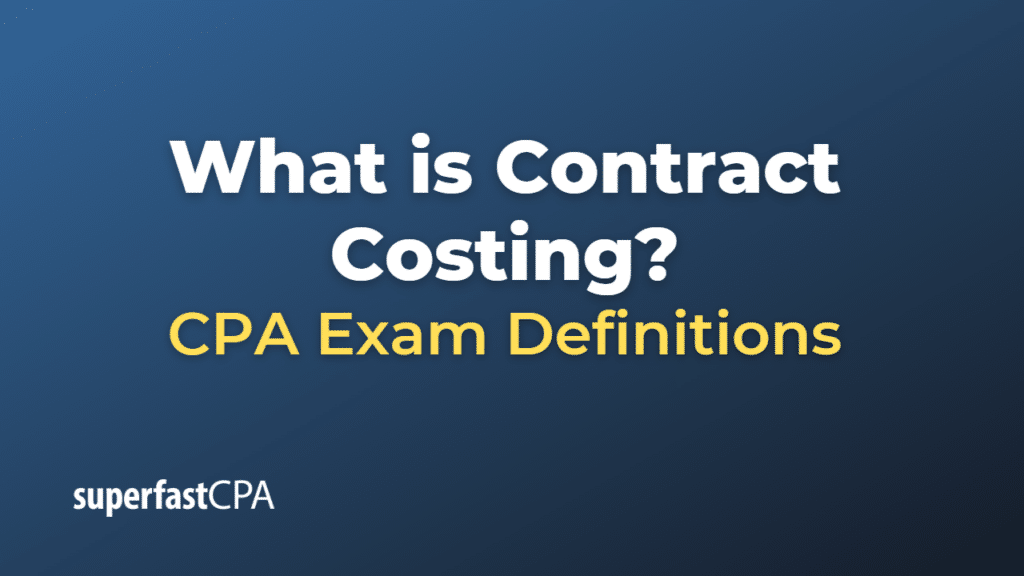Contract Costing
Contract costing is a method of cost accounting used to allocate, record, and analyze the costs associated with individual contracts or projects. It is primarily used in industries where large, complex, and unique projects are undertaken, such as construction, engineering, and manufacturing. The primary objective of contract costing is to determine the total cost of each contract and assess its profitability, enabling organizations to make informed decisions about pricing, resource allocation, and project management.
Contract costing typically involves the following steps:
- Cost allocation: Costs are allocated to individual contracts based on the resources utilized for each project. These costs may include direct materials, direct labor, and direct expenses, as well as indirect costs, such as overheads and administrative expenses, which are apportioned to each contract based on an appropriate basis (e.g., labor hours, machine hours, or a percentage of direct costs).
- Cost recording: Costs are recorded and tracked throughout the duration of the contract using a separate cost ledger or a project management system. This enables organizations to monitor costs in real-time and compare them against budgeted or estimated costs.
- Cost analysis: The accumulated costs are analyzed periodically to determine the contract’s progress, profitability, and cost-efficiency. This analysis may involve comparing actual costs against budgeted costs, assessing the costs of individual activities or resources, and identifying areas where cost savings or improvements can be made.
- Cost control: Based on the cost analysis, organizations can implement cost control measures to ensure that the contract remains within budget and meets its financial targets. This may involve renegotiating supplier contracts, improving resource allocation, or implementing process improvements to reduce costs.
- Final account: Once the contract is completed, a final account is prepared, detailing the total costs incurred, the revenue earned, and the overall profitability of the contract. This information can be used to evaluate the success of the project and inform future pricing and bidding strategies.
Contract costing plays a crucial role in managing large projects by helping organizations monitor and control costs, assess profitability, and make informed decisions about resource allocation and pricing. By implementing effective contract costing practices, businesses can improve their financial performance, reduce risks, and enhance their competitiveness in the market.
Example of Contract Costing
Let’s consider a hypothetical example involving a construction company that specializes in building residential houses.
Scenario: A construction company has entered into a contract to build a custom home for a client at an agreed-upon price of $300,000. The construction company needs to manage the costs associated with this contract to ensure that it remains within budget and generates a profit.
In this case, the construction company might apply contract costing as follows:
- Cost allocation: The company allocates costs to the contract, including direct materials (e.g., bricks, cement, wood), direct labor (e.g., wages for construction workers, architects, and engineers), and direct expenses (e.g., equipment rentals, permits). It also allocates indirect costs, such as overheads and administrative expenses, to the contract based on an appropriate basis (e.g., a percentage of direct costs or labor hours).
- Cost recording: Throughout the construction process, the company records and tracks costs associated with the contract using a cost ledger or a project management system. This enables the company to monitor costs in real-time and compare them against the budgeted amounts.
- Cost analysis: Periodically, the company analyzes the costs incurred to determine the project’s progress, profitability, and cost-efficiency. This may involve comparing actual costs against budgeted costs, assessing the costs of individual activities or resources, and identifying areas where cost savings or improvements can be made.
- Cost control: Based on the cost analysis, the company implements cost control measures to ensure that the contract remains within budget and meets its financial targets. This may involve renegotiating supplier contracts, improving resource allocation, or implementing process improvements to reduce costs.
- Final account: Once the construction of the custom home is completed, the company prepares a final account detailing the total costs incurred, the revenue earned from the client, and the overall profitability of the contract. This information can be used to evaluate the success of the project and inform future pricing and bidding strategies.
In this example, contract costing helps the construction company effectively manage the costs associated with building the custom home, ensuring that it remains within budget and generates a profit. This process contributes to better project management, financial performance, and competitiveness in the market.













